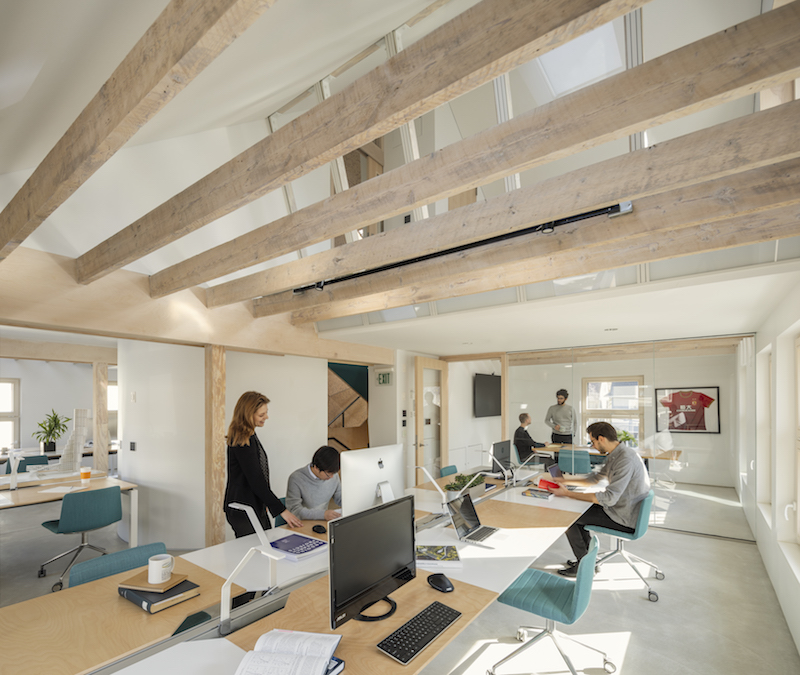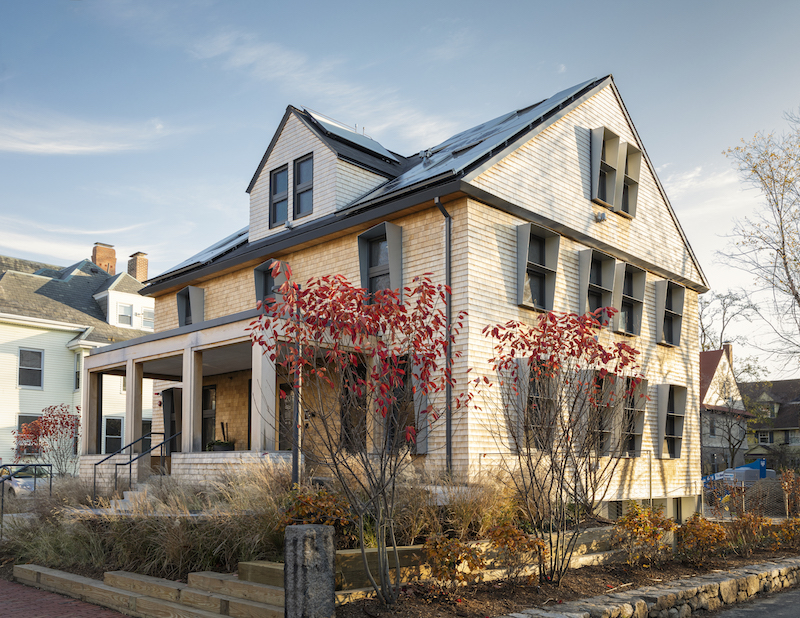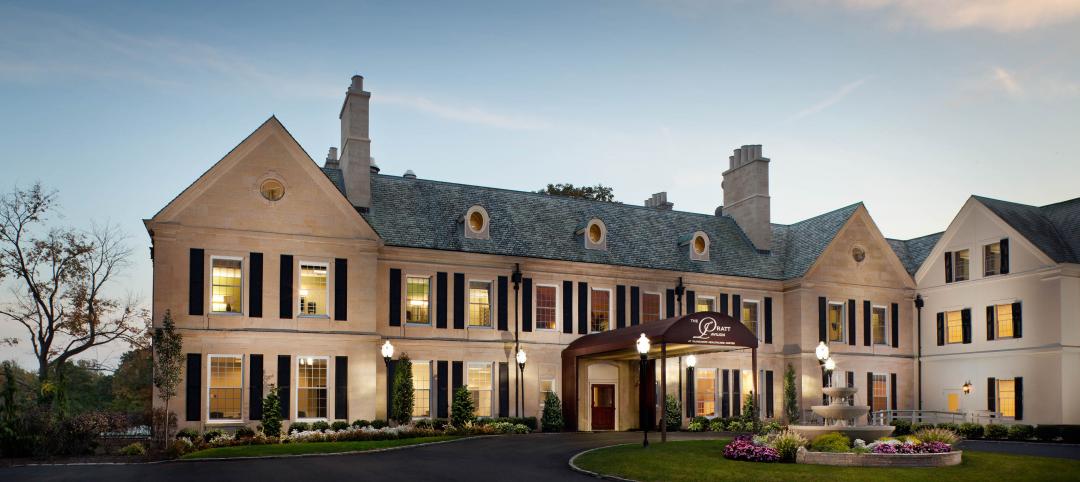The Harvard Center for Green Buildings and Cities (CGBC) has completed the retrofitting of its 4,600-sf headquarters in Cambridge, Mass., built in 1924, into a living laboratory called HouseZero, whose design is driven by ambitious performance targets that include nearly zero energy use for heating and cooling, zero electrical lighting during the day, operating with 100% natural ventilation, and producing zero carbon emissions.
Snohetta was this project’s chief architect, and Skanska Teknikk Norway its lead energy engineer.
A prototype, HouseZero has been set up to address a chronic problem within the built environment: inefficient existing structures. The building inventory in the U.S. is estimated to account for 40% of the country’s energy consumption, with 25% of that usage attributed to housing alone. The annual costs of residential energy consumption are enormous: $230 billion for heating, cooling and powering the nation’s 113.6 million households.
CGBC, at the Harvard Graduate School of Design, has embedded hundreds of sensors connected by several miles of wiring within each component of HouseZero, from which it will draw data points that inform its researchers about the building’s behaviors. These data will be the basis of computational simulations for fuel research that could help the Center develop new systems and algorithms that promote energy efficiency, health, and sustainability.
The goal of HouseZero is to create a blueprint for reducing energy demands and increasing cost savings for property owners. “HouseZero challenged us to rethink the conventions of building design and operation to enhance lifelong efficiency and quality of life for occupants,” says Ali Malkawi, founding director of CGBC, and creator and leader of the HouseZero project.
An example of this rethinking is natural ventilation that is controlled by a window actuation system that employs sophisticated software and sensors arrays to automatically open and close windows to maintain a quality internal environment throughout the year. The building itself will strive for best possible comfort. However, Malkawi notes, a window can always be opened manually to ensure individual comfort.
HouseZero’s third floor features a flexible, highly-controlled and monitored experimental space—dubbed the LiveLab—that’s hardwired to the building’s energy exchange system. The space will allow for the testing, swapping, and optimization of new technologies. An immediate goal is to beta test new technologies that can eventually replace the building’s ground source heat pump for peak conditions.

HouseZero is naturally ventilated, and designed to use only natural lighting during the daytime hours. Image: Michael Grimm
The building will also be used to research how structures connect with and respond to its natural environment. Its envelope and materials were designed to interact with the seasons and the exterior environment. The building, according to CGBC, will adjust itself to reach thermal comfort for its occupants.
HouseZero will achieve zero net energy with the help of a rooftop PV array that provides renewable electrical energy for the heat pump as well as for energy required by user equipment. A battery system is employed for night time use and low-sun conditions.
To meet proposed emission cuts of the Paris agreement, HouseZero will offset the hidden emissions generated throughout the building’s anticipated 60-year life cycle, from the fabrication and transport of building materials and construction processes, to maintenance and decommissioning.
The rest of the renovation team on this project included Columbia Construction (CM), Silman Associates (SE), BR+A (MEP/FP/lighting), Bristol Engineering (CE), WindowMaster (BAS/Controls/Natural Ventilation systems), Brekke & Strand Akustikk (acoustrics), Jensen Hughes (code and accessibility consultant), Haley & Aldrich (geotechnical engineer), Syska Hennessy (vertical transportation), Kalin Associates (specifications), Siemens Building Technologies (security systems), Solect Energy (photovoltaic systems), Reed Hilderbrand (landscape architect), Harvard Planning and Project Management; CSL Consulting (project management), and Harvard Graduate School of Design (operations support).
Related Stories
| Nov 3, 2011
GREC Architects announces opening of the Westin Abu Dhabi Golf Resort and Spa
The hotel was designed by GREC and an international team of consultants to enhance the offerings of the Abu Dhabi Golf Club without imposing upon the dramatic landscapes of the elite golf course.
| Nov 3, 2011
2012 Pritzker Architecture Prize Ceremony to be held in China
The tradition of moving the event to world sites of architectural significance was established to emphasize that the prize is international, the laureates having been chosen from 16 different nations to date.
| Nov 2, 2011
Mega deals drive 28% increase in global engineering and construction merger and acquisition value
Financial investors lead mega deal activity, China most active country in global domestic deals.
| Nov 2, 2011
Alexandria Real Estate Equities, Inc. breaks ground on Alexandria Center in Cambridge, Mass.
307,000-sf building to be house to executive offices of Biogen Idec.
| Nov 2, 2011
John W. Baumgarten Architect, P.C, wins AIA Long Island Chapter‘s Healthcare Award for Renovation
The two-story lobby features inlaid marble floors and wood-paneled wainscoting that pays homage to the building’s history.
| Nov 2, 2011
Jacobs announces acquisition of KlingStubbins
Jacobs Engineering Group Inc. announced that it has acquired KlingStubbins. Officials did not disclose the terms of the agreement. Jacobs' acquisition of KlingStubbins, which has approximately 500 employees located in the United States and Asia, particularly enhances the Company's capabilities in design. KlingStubbins provides professional services in planning, architecture, engineering and interiors.
| Nov 1, 2011
Holcim awards winners for North America announced
A socio-architectural project to create regional food-gathering nodes and a logistics network in Canada's high arctic territory won the top prize for North America of $100,000.
| Oct 27, 2011
ASSA Abloy, MAXXESS Systems announce U.S. Aperio integration
Aperio will integrate with MAXXESS's eAXxess and Efusion Event Management Software packages.
| Oct 26, 2011
Metl-Span selected for re-roof project
School remained in session during the renovation and it was important to minimize the disruption as much as possible.
















